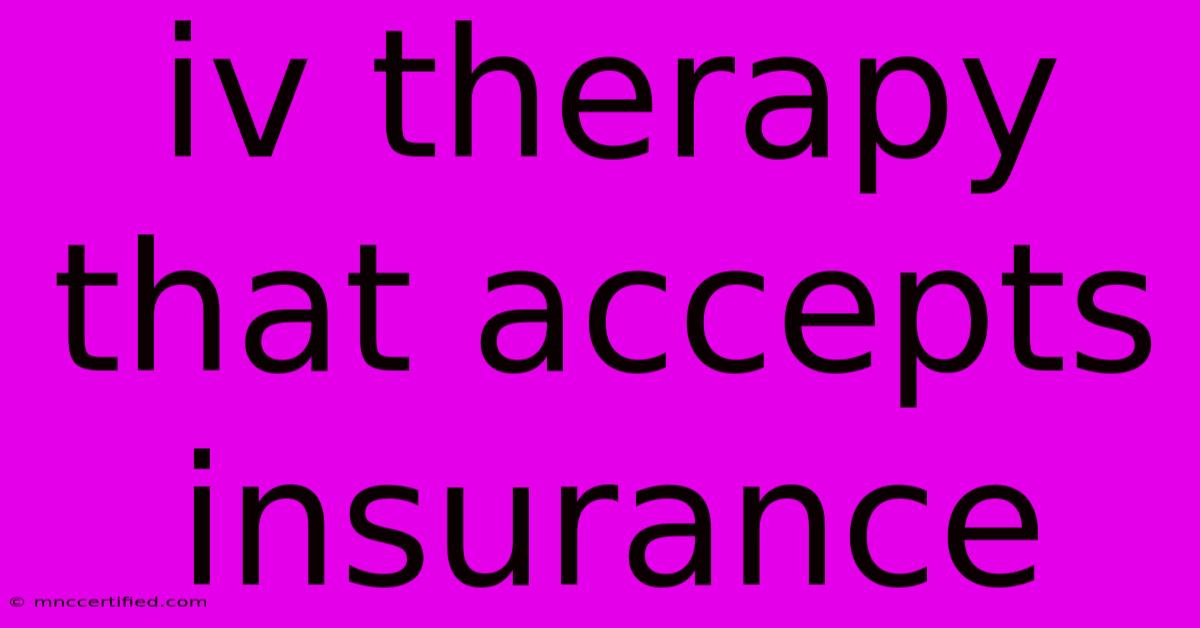Iv Therapy That Accepts Insurance

Table of Contents
IV Therapy That Accepts Insurance: Your Guide to Affordable Hydration and Wellness
Finding affordable healthcare can be a challenge, especially when considering treatments like IV therapy. While IV therapy offers numerous benefits, from boosting immunity to combating dehydration and hangover symptoms, the cost can be a deterrent. This comprehensive guide will walk you through finding IV therapy providers that accept insurance, helping you access this valuable treatment without breaking the bank.
Understanding Insurance Coverage for IV Therapy
The key to accessing affordable IV therapy lies in understanding your insurance plan. Not all insurance plans cover IV therapy, and coverage can vary significantly depending on several factors:
- Your specific plan: Check your policy documents or contact your insurance provider directly to determine what, if any, IV therapy services are covered. Look for terms like "infusion therapy" or "intravenous therapy."
- Your reason for treatment: Coverage often hinges on the medical necessity of the IV therapy. Treatment for dehydration following illness or surgery is more likely to be covered than IV vitamin drips for wellness purposes. Document your medical history and consult your doctor to determine the medical necessity for IV therapy.
- In-network providers: Insurance companies often have networks of preferred providers. Using an in-network provider can significantly reduce your out-of-pocket costs.
- Pre-authorization: Some insurance plans may require pre-authorization for IV therapy, meaning you need to get approval from your insurer before receiving treatment. Failing to obtain pre-authorization can lead to higher costs or denied claims.
Common Covered Reasons for IV Therapy:
- Severe Dehydration: This is often covered, especially if it's a result of illness or a medical condition.
- Medication Administration: IV antibiotics, pain medication, and other treatments administered intravenously are typically covered under medical insurance.
- Post-Surgical Hydration: Replenishing fluids after surgery is often a covered expense.
- Treatment of Certain Medical Conditions: Specific conditions might warrant IV therapy as part of a treatment plan, leading to insurance coverage.
Reasons Often Not Covered:
- Wellness IV drips: These typically focus on vitamins and minerals for general health and well-being, and are often considered elective treatments, making insurance coverage less likely.
- Cosmetic IV treatments: These are rarely covered by insurance plans.
Finding IV Therapy Providers That Accept Insurance
Finding the right provider is crucial. Here's how to identify those that accept your insurance:
- Contact your insurance company: This is the most reliable way to determine which providers in your network offer IV therapy and accept your insurance.
- Use online search engines: Search for "IV therapy near me that accepts [your insurance provider's name]". Many providers list their insurance affiliations on their websites.
- Check provider websites directly: Review the provider's website for information about their insurance policies. Look for a section on "insurance," "billing," or "payments."
- Call clinics directly: Don't hesitate to contact clinics directly to inquire about their insurance acceptance policies. Clarify if they are in-network with your provider and what documentation you'll need.
Pro Tip: Always verify insurance coverage before your appointment to avoid unexpected bills. Get the information in writing to confirm the specifics of your coverage.
Maximizing Your Insurance Coverage for IV Therapy
To get the most out of your insurance benefits:
- Obtain a referral from your doctor: A referral can increase the likelihood of your insurance covering the IV therapy.
- Maintain accurate records: Keep detailed records of all medical visits, including your diagnosis, treatment plan, and insurance claim information.
- Understand your Explanation of Benefits (EOB): Carefully review your EOB to understand what portions of your IV therapy treatment were covered and what your responsibility is.
- File appeals if necessary: If your claim is denied, understand your right to appeal the decision. Provide supporting documentation to demonstrate the medical necessity of the IV therapy.
Conclusion: Accessing Affordable IV Therapy
While not all insurance plans cover IV therapy, many do, particularly for medically necessary treatments. By understanding your policy, verifying coverage beforehand, and selecting in-network providers, you can access this beneficial treatment without undue financial strain. Remember to always prioritize communication with your insurance provider and healthcare professionals to ensure a smooth and affordable experience.

Thank you for visiting our website wich cover about Iv Therapy That Accepts Insurance. We hope the information provided has been useful to you. Feel free to contact us if you have any questions or need further assistance. See you next time and dont miss to bookmark.
Featured Posts
-
How Much Is Flood Insurance In Sc
Nov 19, 2024
-
Mountain Laurel Insurance Company
Nov 19, 2024
-
Gateway Insurance Company Florida
Nov 19, 2024
-
Midlands Weather Alert Freezing Snow
Nov 19, 2024
-
High Risk Life Insurance Carriers
Nov 19, 2024